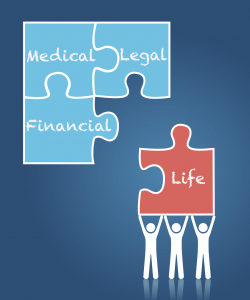Understanding choices, and making decisions for yourself with the support you need.
What is Supported Decision-Making (SDM)?
Supported Decision-Making (SDM) is an alternative to guardianship/conservatorship. While not suitable for everyone, SDM is appropriate for individuals who, with support, can take in information, evaluate it, make decisions about their lives, and communicate those decisions effectively. It allows people with disabilities to choose individuals close to them to help support them in gathering and understanding information, making decisions, and communicating those decisions to others. It ensures a person’s right to make their own important life decisions and to have their decisions respected with the support of the people they choose.
How Does It Work in Washington State?
In 2020, Washington state passed a law that formalizes Supported Decision-Making as an alternative to guardianship/conservatorship. Washington law requires considering alternatives to guardianship/conservatorship first, such as Supported Decision-Making.
When might supported decision-making be appropriate?
- An adult with a disability needs to be able to make decisions, even if only with support. An adult with a disability must have trustworthy supporters who are willing and able to commit to assisting them in their decision-making.
- The adult with a disability and their supporters will have an important conversation addressing the areas in which the adult feels they need support, how they will communicate their needs for support, and their preferences for receiving that support.
- The adult with a disability may also execute a legal document called a Power of Attorney. In this document, they give legal authority to the supporter(s) to assist them with personal/healthcare decisions and financial decisions.
- The adult with a disability may also execute a Supported Decision-Making Agreement, which outlines how they will request support and specify how they wish to receive that support when needed. This approach aligns closely with the concept of person-centered planning. By setting up their life in this way, individuals with disabilities can achieve maximum independence tailored to their specific needs and circumstances.
- Respect for the autonomy of the adult with a disability is the cornerstone of supported decision-making. Supporters do not make decisions for the adult with a disability but rather assist the adult in making their own decisions, a skill that will serve the adult their entire life.
-
For more information, sample Supported Decision-Making Agreements, and resources available to you visit https://www.washingtonlawhelp.org/resource/supported-decision-making-agreements.
Learn More
National Resource Center for Supported Decision-Making
Northwest Justice Project
Washington Law Help
Missouri Family to Family: Partnering Together in Supported Decision Making
Stories of Supported Decision-Making
Conversations with Ivanova on Supported Decision Making (video)


